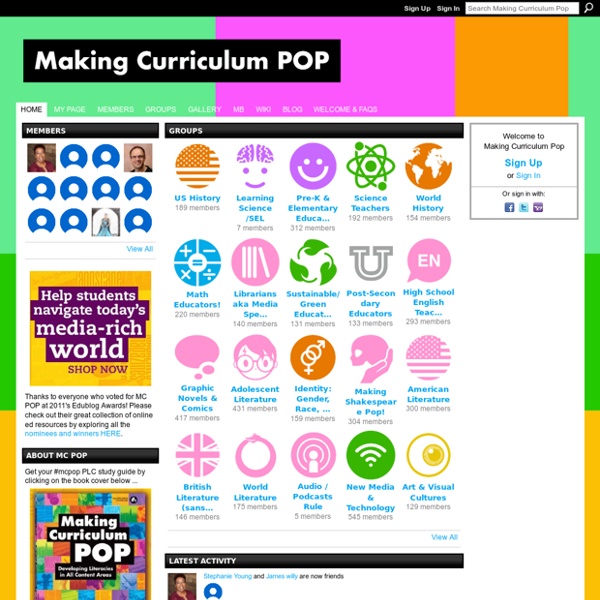



Literally Unbelievable This New Hamburglar Commercial Just Raises Even More Questions And the answers to those questions raise EVEN MORE QUESTIONS. I can't stop cringing at this new commercial from McDonalds. Maybe I'm a little old-fashioned. Maybe I like my Hamburglar not complaining about his wife. Read More Links To The Onion on Facebook Will Be Tagged as Satire Wait. The popular satire site The Onion is now being tagged as "satire" on Facebook. Read More Literally Unbelievable, a Tumblr Devoted to People Who Think Onion Articles Are Real This looks promising: {*style:<a href=' Unbelievable{*style:</a>*} is a new Tumblr that screencaps outraged Facebook comments on {*style:<i>*}Onion{*style:</i>*} articles from people who either haven't noticed that the article in question is from {*style:<i>*}The Onion{*style:</i>*} or simply don't know that {*style:<i>*}The Onion {*style:</i>*}is a satirical publication.
ATN-reading-lists - Read Alikes Skip to main content Get your Wikispaces Classroom now: the easiest way to manage your class. guest Join | Help | Sign In ATN-reading-lists Home guest| Join | Help | Sign In Turn off "Getting Started" Loading... Curriculum21 101 Web 2.0 Teaching Tools Online tools and resources have made it easier for teachers to instruct students, and for students to collaborate with those teachers and with other students and parents. These “Web 2.0” teaching tools aren’t magical, but they may seem to defy definition at times since they save time, help you to stay organized, and often take up little space on a computer. Some of these applications are Web-based, which means that they can be accessed from any computer. The following list is filled with tools that will make a teacher’s, or those enrolled in the best online education programs, life easier. The categories are listed in alphabetical order and the links to each tool are also listed alphabetically within those categories. Aggregators The following list includes free tools that you can use to stay on top of current events, including headlines and blogs. Aggie: Aggie is an open source news aggregator that’s also a desktop application. Bookmark Managers Classroom Tools Collaboration E-learning
The Graphic Classroom K12 Online Conference 10MT | The 10-Minute Teacher Show | The 5-day a week podcast for remarkable but very busy teachers. by Vicki Davis: Teacher, Blogger, Edtech Experimenter Cool Cat Teacher Blog 21st Century Teaching & Learning How'd You Do That? Creating & Sharing Digital Flyers, Posters & Infographics. It's been almost 8 years since I created my first digital flyer for this site. Ever since, every time I post one, I get questions about how it was created. Over the years, the tools I've used to translate the thoughts swirling around in my head into a visual have changed, but some things haven't. That said, the very first digital flyer I ever made was inspired by the work of Carl Harvey. Eventually, I graduated from MS Word (sorry Bill!) These days, I use Canva almost exclusively as my creation tool of choice. Finally, let me just say that I've never, ever endorsed a product on this blog in exchange for any kind of compensation - and I never will.